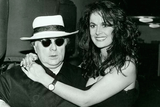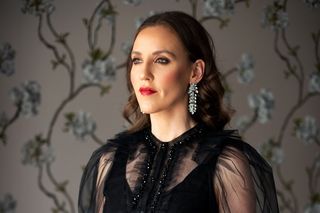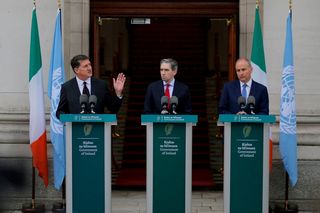From crazy love to heartache for Van Morrison and Michelle Rocca - the art of celebrity divorce
Separating is a marathon rather than a sprint, as evidenced by a statement issued by singer Van Morrison last weekend, in which he refers to his divorce as a ‘hugely wearying experience’. Treating it as you would any grieving process — as a journey with lots of ups and down — may be the key to doing it better, writes Lia Hynes




The notoriously reclusive, ill-tempered musical genius and the beautiful former Miss Ireland; at the peak of their relationship, Van Morrison and Michelle Rocca were the stuff of social diarist’s dreams.
Last week, it all came to an end, with the couple finally being granted a divorce. In a statement, Morrison, now 72, confessed: “At my age, I have found it to be a hugely wearying, protracted experience and I’m relieved that it has finally reached a conclusion.”
The couple first met in the early Nineties at a dinner party at Leixlip Castle given by Desmond Guinness. Both had previously been married. She was wrapped up in the messy fall out of her
relationship to former fiancé Cathal Ryan; she brought him to court seeking damages after an assault at a party. Van was said to have been a pillar of strength throughout that time, attending court everyday with Rocca.
Van Morrison pictured with Michelle Rocca
She appeared on two album covers, Prima Donna and Days Like This, and read poetry on stage at his concerts. Their social circle included the likes of Marianne Faithfull and Mick Jagger, although they were generally a reticent pair, preferring the charms of domestic bliss with their two children, to the spotlight of a high-profile celebrity existence.
Together they set up home in Dalkey where Michelle stayed with the children whilst Van toured. It seemed like the pair might finally achieve their happy ever after.
Then in December 2009, the birth of a son, not to Michelle, was announced on Van Morrison’s official website. The statement read that the singer and his sometime tour manager Texan Gigi Lee wished to announce the birth of a son, George Ivan Morrison III: “Gigi and Van Morrison are proud to announce the birth of their first-born son, Little Van, born Dec 28, 2009 — the spitting image of his daddy. He is a dual citizen of Northern Ireland/UK and the United States.”
Morrison immediately issued a counter statement claiming he was “very happily married to Michelle Morrison, with whom I have two wonderful children.”
The news is said to have come as a complete shock to his wife. Gigi and Morrison are thought to have first met in the late Nineties, according to friends, at a dinner party in the home of Marina Guinness. Gigi, who arrived with Rosy ‘Sugar’ Hall, sister of Jerry Hall, bore a resemblance to Pamela Anderson, recalled a fellow diner.
As events unfolded, it became clear the Ms Lee was responsible for the post, not hackers, as was originally claimed, and herself and Morrison eventually abandoned legal attempts to prevent further comment on their relationship. There were, at one time, reports of Lee and Morrison living together in Belfast. A friend of Michelle’s would later tell the Sunday Independent that the Gigi situation was the death knell to the relationship.
Van Morrison says he is glad that his protracted divorce from his Michelle Rocca has concluded
In an almost unimaginably horrific turn of events, baby George died in January 2011, having slipped into a diabetic coma. In October of that year, his mother Ms Lee passed away in a Belfast hospice from throat cancer, having refused radiation therapy during pregnancy for fear it would harm her baby.
Last weekend’s divorce announcement is not the first time Morrison, a shy, quiet man at the best of times, has issued a public statement about his former wife. In 2015, during legal wrangling in the High Court, Michelle cited Van’s desire for privacy in her bid to stop work on her neighbour’s property. When he “gets out of his car, he wants to be able to walk to the hall door without feeling he was being overlooked”, her statement claimed. He instantly released a counter statement citing that the couple had been legally separated since 2013 and that he had never lived in the house in question: “As we have been legally separated since September 2013, I would appreciate if I was not included in any further references to this ongoing action.” From maestro and muse to bickering over planning permission.
In his post divorce statement last week, Van-the-Man thanked his support circle of family and friends for “providing respite from the storm over the past eight years”, saying: “You know who you are and I’m eternally grateful.” Storm indeed.
Divorce is brutal, no matter what your circumstances, or how kind, or bountiful life has been to you otherwise.
Russell Crowe, one of the most highly paid actors in the world and the star of such blockbuster hits as Gladiator, has recently announced a public auction at Sotheby’s Australia, titled Russell Crowe: the Art of Divorce, to take place on April 7 of this year (his birthday and wedding anniversary), at which he will sell personal memorabilia, including items shared by his former wife Danielle Spencer.
The actor, who has been landed with a settlement said to be costing him in the realm of $20m, told Australia’s Daily Telegraph: “We’ve been separated over five years now, our divorce should be finalised around the time of the auction. Just as we collaborate on the upbringing of our kids, it’s easy for us to work together on something like this. I think she feels the same way I do in regards to just moving on things that help create space for the future.” Three rooms of things, apparently.
Even Chris Martin, he of the famous conscious uncoupling and ongoing amicable separation with Gwyneth Paltrow — the pair holiday together, spend birthdays en famille, and post about each other on Instagram — has spoken of the depression he suffered for some time after the couple’s split.
No one gets out of divorce unharmed, but is it possible to make things a little easier for oneself?
“Divorce is acknowledged as one of the top stressors in life,” says psychotherapist and couples’ counsellor Lisa O’Hara (lisaohara.ie). “It is important to acknowledge that. Try to be patient if one partner is not in the same place. Often, there are two responses; guilt, and rejection. So people can be in very different places.”
Grief is an inescapable part of the process. “Grief after a divorce is very painful,” reflects O’Hara. “Sometimes more so than in the case of bereavement, because with divorce often one person has made the choice, so there is a rejection involved that is not an issue with bereavement. There is a cycle of grief. The period of mourning can last longer than we expect. You are not going mad. You are grieving.”
In her book, When a Relationship Ends: Surviving the Emotional Roller-Coaster of Separation, she compares separating to a “living death”. The fact that a partner is still alive makes it “a more complex loss from which to recover”.
There is no short-cut to dealing with the fall out of a separation.
“Without acknowledgment and understanding of the necessary grieving journey that accompanies such a huge life change, separating can become more complicated than it needs to be,” advises O’Hara.
Allowing this process to fully take place, for as long as that might take, is crucial to recovering from a divorce, she explains.
As with a death, she recommends not making any major life decisions in the first six months to a year after the separation, although she acknowledges that financial considerations might not allow for this period of dust settling. If this is the case, try to be aware of, and avoid in as much as is possible, emotions ruling your decisions.
As O’Hara explains: “Decisions made during an emotional time can be ill-considered and may be regretted later.”
Separating is a marathon, rather than a sprint, explains O’Hara, and as such, while you will develop resilience along the way, expect to on occasion “have to stop and take a breather for a while”.
You will surprise yourself. “People who have gone through a separation report that they discover a personal strength they weren’t aware they were capable of.”
Be aware that what O’Hara terms “gender differences” may inform your spouse’s behaviour, causing them to act in a manner different from what seems natural to you, and which may heighten your feels of confusion, anger and anxiety.
Whether or not you were the one to instigate the separation, it is crucial to acknowledge your feelings, advises O’Hara. “When we experience loss, especially a loss like separation, our feelings become heightened and can lie very close to the surface,” she explains.
Crying is a good way to process emotions, although O’Hara points out that not everyone finds it easy to shed tears. If this is the case in your situation, counselling, however scary that may seem, can be an excellent way to access feelings that you are not acknowledging.
“Somewhere along the way the realisation will hopefully come that perhaps the worst of the hurt is behind you,” she says. “You may become aware that at a certain juncture you made a choice or a decision about how to separate that will define you: either that it will control you for the rest of your life or will allow you into the driver seat of your own life, with you taking responsibility for what happens next.”
The latter is not easy, but it is so worth it.
Join the Irish Independent WhatsApp channel
Stay up to date with all the latest news



















